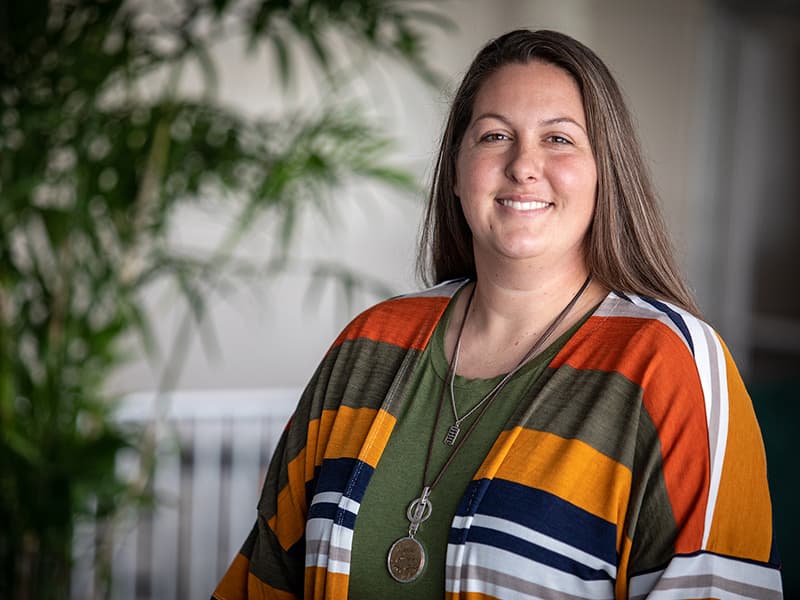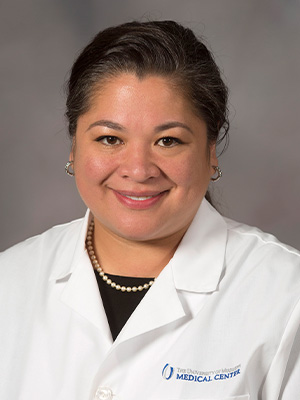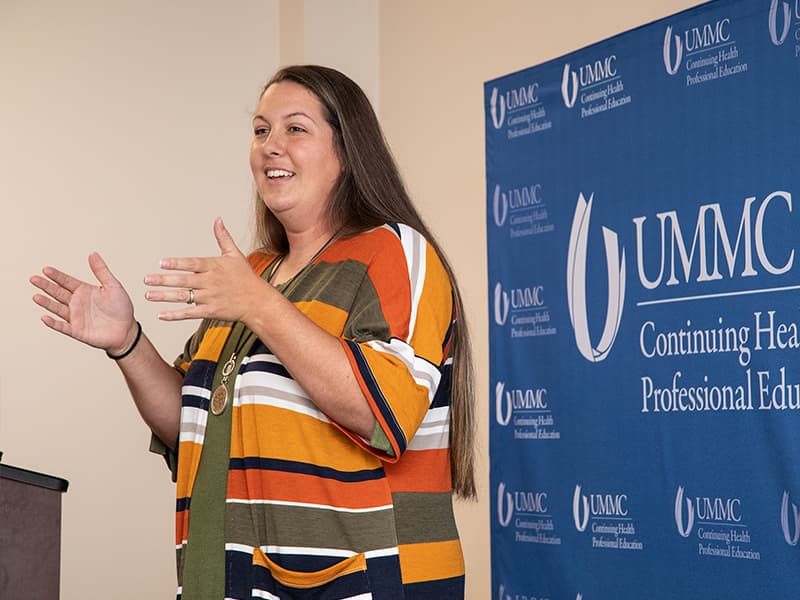A kidney transplant wait can take years - but just months with a live donor

Krystal Richmond thought she’d been cleared to donate a kidney to her husband, whose end-stage renal disease was confirmed when he decided on a whim to get it checked.
The Louisiana resident was shell-shocked when her physician in Shreveport said tests showed her healthy kidneys had an unusually large number of vessels.
“He said, ‘We can’t take you here,’” Richmond said. “I went from hero to zero.”
But as it turned out, the loss of her super powers was temporary.
As she and her husband Matt drove back to their home in rural Wisner, La., Richmond looked out of the window, trying to hide her tears. “We thought God had answered our prayers, but now there’s a roadblock,” the 33-year-old remembered of that fall day in 2018.

Not 30 minutes later, her cell phone rang. It was one of her doctor’s staff. “She said she had called the University of Mississippi Medical Center, and that I’d see them at 8 in the morning,” Richmond said. “That no turned into a yes.”
They sat down with Dr. Mark Earl, associate professor of transplant surgery, whose specialty is abdominal organ transplant. “Dr. Earl … He’s confident,” Richmond said. “He said, ‘Not a problem for me. We’ve got this.’”
Matt Richmond’s surgery through University Transplant took place June 20. Today, the couple who between them have four children has returned to a life free of fatigue and home dialysis for Matt, a pipeline supervisor, and constant worry for Krystal, a former teacher.
Because of Krystal’s generosity, Matt didn’t have to wait long for a kidney. The average wait time is three to five years at most centers, stretching to seven years in some areas of the country, the National Kidney Foundation says. One of every 20 people waiting for a kidney die each year.
Their journey underscores the urgent need for more live organ donors. As of September 2019, 114,000 children and adults in the United States were on a transplant waiting list, the vast majority – including about 1,000 Mississippians – needing a kidney.
Recipients of a living donor kidney usually lead longer, healthier lives compared to those who receive a kidney from someone who has died. In 2018, there were a total 17,553 donors nationwide, with 10,722 being deceased and 6,831 of them living donors, statistics show.

“If we’re going to make an impact on kidney disease in Mississippi, we’re going to have to use more living donors,” said Dr. Felicitas Koller, assistant professor of transplant surgery who specializes in abdominal organ transplant. She transplanted Krystal’s kidney after Earl removed it.
University Transplant is taking steps to increase the number of potential live donors by offering education for those exploring donation. Live webinars are set for 7 p.m. Nov. 12 and 7 p.m. Dec. 10; participants can attend the classes at the Mississippi Organ Recovery Agency, 4400 Lakeland Drive in Flowood, or take part via a computer or mobile device.
University Transplant surgeons and the Medical Center’s living door team will discuss what it means to be a live donor, and what to expect throughout the evaluation process, surgery and recovery.
Anyone with two healthy kidneys can potentially be a live donor, and both the donor and recipient generally can do just fine with one healthy kidney. Most surgeries are laparoscopic, as opposed to the previous practice of removing a donor kidney via a large incision that can cause a longer recovery period. A donor usually spends one to three days in the hospital.
“Living donated kidneys tend to be uncomplicated,” said Dr. Franco Cabeza Rivera, assistant professor of nephrology. “These kidneys are working until the very last minute, and as soon as we place them in the recipient, they begin working again.”
About 800 people in end-stage or advanced kidney disease are waitlisted for a transplant at UMMC. Anyone over 18 and in good physical and mental condition can be considered as a donor, Cabeza Rivera said.
Being the right blood type for a match is only one part of live donor screening, Koller and Cabeza Rivera said. It’s an exhaustive process involving an assessment of any present or past diseases. “The team that does the screening includes a patient donor advocate who makes sure nothing is done inappropriately,” he said. “It’s a group decision.”
Down time after surgery is usually shorter with laparoscopic surgery, Koller said. “If you work a day job, maybe two weeks, and if your job involves significant labor, about four to six weeks.”
The recipient’s insurance typically pays for the donor’s medical workup and surgery, Koller said. “It saves the insurance company money, because it’s cheaper than keeping the recipient on dialysis.”
Richmond is one of nine live kidney donors at the Medical Center through mid-fall of this year. That’s the maximum previously transplanted annually, so by year’s end, a new record should be set, Cabeza Rivera said. As of Oct. 28, a total 110 kidneys overall had been transplanted at UMMC this year.
“Our real goal should be two live kidneys a month, or 15-20 percent of our total kidney donations,” he said.
Matt Richmond, 43, has coped with major heart issues his entire life and was diagnosed with a kidney disease in his early 20s, before he and Krystal met. Both of his brothers died early from heart disease.
In late spring 2018, Matt mentioned to Krystal that he hadn’t had his kidneys checked in a while. They crossed that bridge at his heart appointment that summer. It’s time, his doctor told him, for dialysis.

“We thought out of the hundreds of people we knew, family and church family and work friends, there’d be somebody who would donate,” Krystal said.
“There were some people who wanted to, but that didn’t mean they were able,” she said. “My mom wanted to, but she smokes. I never thought I would be a match, but they told me I was compatible.”
Mississippi’s health demographics hinder live donations. “Obesity is the big problem, and with that come other conditions, like diabetes and hypertension,” Cabeza Rivera said. “A lot of what I see is patients whose relatives have the same health problems, or are going in that direction.”
If she hadn’t been a match, Krystal said, she would have wanted to donate a kidney to someone other than Matt. She would have taken part in a kidney “chain” or swap that benefits two recipients. The way it works: a live donor who isn’t a match for his intended recipient is paired with another live donor who isn’t a match for his intended recipient – but the two are matches for each other’s intended recipients.
Koller encourages those considering donation to attend one of the educational sessions. “Take some time to think about it, and ask questions before you come to a decision,” she said.
Before his surgery, “I was pretty sick,” Matt said. “I didn’t realize how sick I was until I got better.”
“It hurt,” Krystal said of her own surgery. “But you get over it, and it’s worth it.”
To take part in UMMC’s transplant education classes at 7 p.m. Nov. 12 and 7 p.m. Dec. 10, come to the Mississippi Organ Recovery Agency, 4400 Lakeland Drive in Flowood. Or, call in from a mobile device at 1-415-655-0001 or go to umc.webex.com. The access code for both is 808 239 773.


